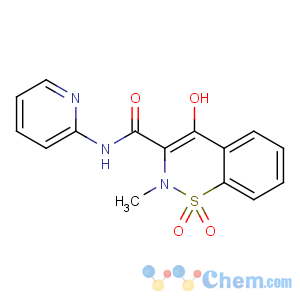piroxicam usp
-

Molecular Structure
Detailed Description
Product Name: piroxicam usp
Synonyms: PIROXICAM; 4-hydroxy-2-methyl-n-2-pyridinyl-2h-1,2-benzothiazine-3-carboxamide 1,1-dioxide; (3R)-2-methyl-4-oxo-N-(pyridin-2-yl)-3,4-dihydro-2H-1,2-benzothiazine-3-carboxamide 1,1-dioxide; 4-hydroxy-2-methyl-N-(pyridin-2-yl)-2H-1,2-benzothiazine-3-carboxamide 1,1-dioxide
CAS: 36322-90-4
EINECS: 252-974-3
MF: C15H13N3O4S
MW: 331.3464
Assay: 99%
Appearance: White powder
Density 1.563g/cm3
Refractive index 1.714
2. Descriptions:
Piroxicam (INN, BAN, USAN, AAN; in some countries it is spelt piroksikam or piroxikam) is a non-steroidal anti-inflammatory drug (NSAID) of the oxicam class used to relieve the symptoms of painful, inflammatory conditions like arthritis. Piroxicam works by preventing the production of a certain type of body chemical called prostaglandins which are involved in the mediation of pain, stiffness, tenderness and swelling. The medicine is available as capsules, tablets and (not in all countries) as a prescription-free gel 0.5%. It is also available in a betadex formulation, which allows a more rapid absorption of piroxicam from the digestive tract.
It was originally brought to market by Pfizer under the tradename Feldene in 1980, became generic in 1992, and is marketed worldwide under many brandnames.
It used in the treatment of rheumatoid and osteoarthritis, primary dysmenorrhoea, postoperative pain; and act as an analgesic, especially where there is an inflammatory component. The European Medicines Agency issued a review of its use in 2007 and recommended that its use be limited to the treatment of chronic inflammatory conditions, as it only in these circumstances that its risk-benefit ratio proves to be favourable.

- piroxicam usp




